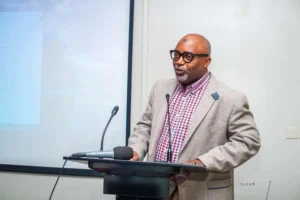Changing the Narrative: Why West African Media Is Embracing Peace Journalism
TMS PEACE JOURNALISM, 11 Aug 2025
Mohammed Ibrahim | Peace News - TRANSCEND Media Service
7 Jul 2025 – In a media landscape often dominated by sensationalism and conflict-driven content, a quiet revolution is taking place. Across West Africa, radio stations are tuning into peace. These media houses are shifting their focus to peace journalism, using their platforms to promote dialogue, resolve conflicts, and build resilient communities.
At the forefront of this movement is Radio Peace, a community radio station located in the Central Region of Ghana. Co-initiator and Station Manager David Kwesi Ghartey-Tagoe explained that the station was born out of a desire to uplift marginalized voices in the region.

“The Central Region, once the seat of government and the cradle of education, ironically became one of the most deprived. We named the station ‘Peace’ because peace is a prerequisite for development,” he told Peace News Network (PNN).
When Radio Peace began operations in 1999, the region was grappling with numerous family and chieftaincy disputes. While not violent, these conflicts had the potential to escalate. The station responded by adopting participatory strategies like Focus Group Discussions (FGDs) and Participatory Rural Appraisal (PRA) tools to include community voices in its programming.
Ghartey-Tagoe said that rather than rushing to break news, the station takes time to ensure that every side is heard, which he noted was necessary for accuracy and fairness. In 26 years, he said, the station had never been sued.

One example of the station’s impact was in Effutu, a community plagued by annual chieftaincy disputes during its Deer Hunt Festival. “The Chief was often barred from attending the festival by rival factions. Police presence became routine. Through participatory programming and giving voice to all sides, the situation has calmed. The Chief now attends without incident,” he said.
Despite challenges in maintaining audience engagement, Radio Peace strikes a balance between entertainment and education. Ghartey-Tagoe added that the station does not believe it is in competition with anyone but itself, and that it sets its own goals and involves the community as much as possible.
This model is resonating beyond Ghana. Peter Nsoesie, Deputy Editor-in-Chief of DASH TV in Douala, Cameroon, is designing a peace journalism module for his station.
“Peace is essential because unresolved issues over land, family, and resources can spiral into crises. Back in 2007, a community radio [station] called Voice of Manyu helped resolve several land disputes in Mamfe through peace journalism,” Nsoesie shared. He emphasized that radio remains the most trusted medium in communities, even in the era of social media.
The Nigerian perspective echoes the same commitment. Ahmed Maiyaki, Managing Director of Kaduna State Media Corporation (KSMC) located in North Western Nigeria, said broadcast stations have continued to focus on peace building content as a result of the wide impact and reach it drives on targeted audience, especially radio.

He explained that Radio stations play a critical role in building and promoting peace among diverse communities across the West Africa region. “It gives a platform for community and citizens’ engagement initiatives and advocacy with wide and indisputable reach to all segments of society,” he said.
Maiyaki shared a recent example where his station played a role in de-escalating tension and reprisal after some travellers were killed by local militias in Plateau State in North Central Nigeria on June 12. “The special program was designed to douse tension and mitigate possible escalation of the conflict,” he said.
He said that KSMC has continued to initiate robust and citizen-centered content that builds and promotes peace and social cohesion in Kaduna State and beyond. KSMC does this, he said, by reaching five radio stations across the state, producing and broadcasting content in local languages for the state’s diverse people.

From Ghana, a presenter with Nananom FM 92.5, Mohammed Umar Al-Hussein highlighted how the station’s morning show ‘Maakye Show’ includes segments dedicated to promoting peace and discouraging youth involvement in drugs.
“The world has seen enough of the disasters brought by conflict. Peace journalism fosters relationships, national growth, and human rights. Its impact is real. Our listeners now understand the value of peace and seek to avoid conflict,” Al-Hussein said.
Aisha Gambo, a solutions journalism expert with the News Agency of Nigeria (NAN), supports this paradigm shift. “People are tired of hearing bad news with no solutions. Peace and solutions journalism are changing that narrative. They report on responses to social issues so that other communities can learn and adapt,” she explained.
While she hasn’t yet published a story that directly de-escalated tension, Gambo ensures her reporting never incites violence or hatred. She noted that after years of covering crime and corruption “with minimal change,” peace or solutions journalism may possibly be able to deliver “the transformation we seek.”
Ibrahima Yakubu, Team Lead for the Network of Peace Journalists (NPJ) Nigeria, believes the entire continent is gradually embracing this approach because of its measurable impact.
“Peace journalism is reshaping Africa. In Nigeria, it is helping eliminate fake news and reduce division,” he said. “For example, in 2016, when a state governor falsely accused a religious sect of terrorism, it was peace journalists who investigated and cleared the air. The community now lives peacefully.”
Yakubu also cited an incident in Southern Kaduna, where panic spread following reports of Fulani ‘terrorists’ migrating into the area. Peace journalists investigated and revealed the truth that the migrants were not terrorists. Their reporting restored calm to the community. “Peace journalism reduces tension by sticking to facts, not social media speculation. That’s how we stop chaos before it begins,” Yakubu emphasized.
Factors contributing to the trend
Factors contributing to the trend of media embracing peace journalism in West African countries include the desire to promote peaceful conflict resolution, a focus on community building and social harmony, and efforts to address hate speech and misinformation.
Other factors include promoting positive narratives and facilitating understanding among warring communities in these countries.
A Difficult But Growing Movement
Several challenges remain in implementing peace journalism in West Africa. The interviewees agreed that there is a lack of awareness and training on peace journalism practices among the majority of practitioners in the region.
Insecurity is another challenge. Many journalists promoting peace journalism face intimidation and harassment in some hostile communities. Poor working conditions also hinder journalists from practicing peace journalism, as it requires resources to move around and gather information for reports.
Religious and regional divisions pose another major challenge, as some journalists tend to write in ways that protect their religion or ethnicity.
Still, as conflict and misinformation continue to pose challenges, peace journalism offers a hopeful path forward one that turns up the volume on truth, understanding, and unity. “So the increase in media going for peace stories means the future of Africa is bright,” said Al-Hussein of Nananom FM.
_____________________________________________
 Mohammed Ibrahim is a multimedia freelance journalist in Kaduna State, Nigeria. He graduated from the International Institute of Journalism Abuja. In 2016 Mohammed received the Courage in Journalism Award for his investigative reporting, from the Africa Media Development Foundation.
Mohammed Ibrahim is a multimedia freelance journalist in Kaduna State, Nigeria. He graduated from the International Institute of Journalism Abuja. In 2016 Mohammed received the Courage in Journalism Award for his investigative reporting, from the Africa Media Development Foundation.
Go to Original – peacenews.com
Tags: Africa, Alternative Media, Media, Peace Journalism, West Africa
DISCLAIMER: The statements, views and opinions expressed in pieces republished here are solely those of the authors and do not necessarily represent those of TMS. In accordance with title 17 U.S.C. section 107, this material is distributed without profit to those who have expressed a prior interest in receiving the included information for research and educational purposes. TMS has no affiliation whatsoever with the originator of this article nor is TMS endorsed or sponsored by the originator. “GO TO ORIGINAL” links are provided as a convenience to our readers and allow for verification of authenticity. However, as originating pages are often updated by their originating host sites, the versions posted may not match the versions our readers view when clicking the “GO TO ORIGINAL” links. This site contains copyrighted material the use of which has not always been specifically authorized by the copyright owner. We are making such material available in our efforts to advance understanding of environmental, political, human rights, economic, democracy, scientific, and social justice issues, etc. We believe this constitutes a ‘fair use’ of any such copyrighted material as provided for in section 107 of the US Copyright Law. In accordance with Title 17 U.S.C. Section 107, the material on this site is distributed without profit to those who have expressed a prior interest in receiving the included information for research and educational purposes. For more information go to: http://www.law.cornell.edu/uscode/17/107.shtml. If you wish to use copyrighted material from this site for purposes of your own that go beyond ‘fair use’, you must obtain permission from the copyright owner.
Join the discussion!
We welcome debate and dissent, but personal — ad hominem — attacks (on authors, other users or any individual), abuse and defamatory language will not be tolerated. Nor will we tolerate attempts to deliberately disrupt discussions. We aim to maintain an inviting space to focus on intelligent interactions and debates.
Read more
Click here to go to the current weekly digest or pick another article:
TMS PEACE JOURNALISM:
